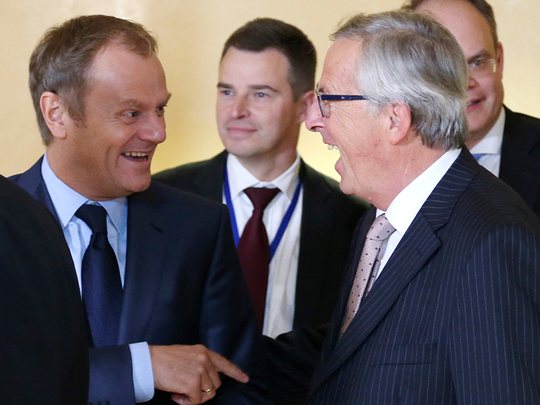
Brussels: The new European Commission led by EU veteran Jean-Claude Juncker formally took office Saturday, promising to “get down to work” as Europe faces a host of political and economic challenges.
The agenda is heavy, with Juncker making it his first task to launch a €300 billion (Dh1.38 trillion) investment plan by Christmas to kickstart a faltering economy plagued by stubborn, near-record unemployment.
The Ukraine crisis meanwhile shows no sign of easing, the European Union is locked in difficult talks on a massive and controversial trade deal with Washington and Britain’s future in the bloc is uncertain.
“Now it’s time to roll up the sleeves and get down to work. Europe’s challenges cannot wait,” Juncker said in a statement Saturday.
“As of today, my team and I will work hard to deliver Europe the new start we have promised.
A first test comes Sunday when pro-Russian rebels plan elections in the areas they control in eastern Ukraine in defiance of the EU which says they are illegal, will not be recognised and undermine fragile peace efforts.
The Commission, the EU’s executive arm, wields huge powers from the massive glass-and-steel Berlaymont headquarters in central Brussels, drawing up the legislative proposals needed to put the member states’ decisions into effect.
Its 23,500 strong staff also submit myriad proposals across the whole agenda, be it on the economy or environment for member state leaders to consider when they meet in the European Council.
Juncker is no stranger to the halls of power in Brussels.
He served for 19 years as Luxembourg prime minister and was head of the Eurozone group of finance ministers during the darkest days of the debt crisis when the single currency seemed on the brink of collapse.
A famously dry sense of humour, an ability to get things done, to find the common ground where none seemed to exist and a convivial approach to life all served him well during the many long nights of the crisis.
Juncker succeeds Portugal’s Jose Manuel Barroso who served 10 years, during which time the EU expanded from 15 to 28 members and the Commission gained unprecedented powers in economic policy, including the right to vet Eurozone member state budgets.
The parlous state of the economy, however, with growth struggling and new jobs in short supply, has taken the gloss off the European dream for many and Euro-sceptic parties made significant gains in May elections.
In response, Juncker has promised repeatedly to make Europe work again for its 500 million citizens.
“This is the ‘last-chance’ Commission,” he told the European Parliament last month. “Either we succeed in bringing Europe’s citizens together, to drastically reduce the level of unemployment and offer a way forward for our youth, or we fail.”












